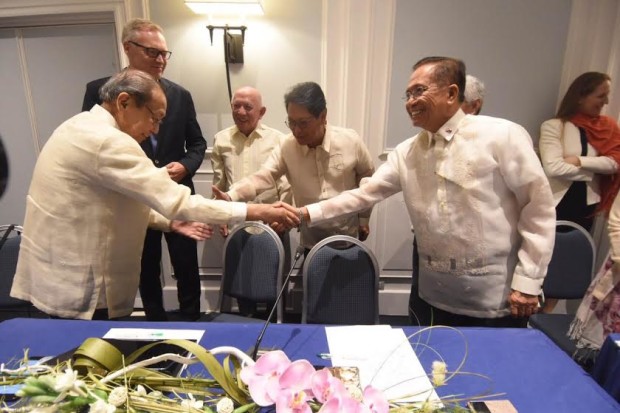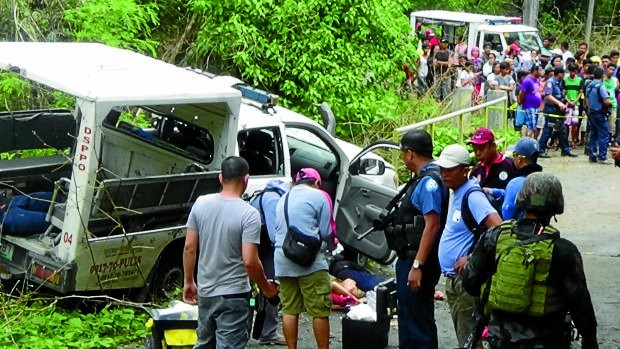Gov’t-NDF peace talks to resume — joint statement

Presidential Peace Adviser Jesus Dureza (right), Labor Secretary Silvestre Bello III (second from right) , shake hands with Communist Party of the Philippines founder Jose Maria Sison (left) and Fidel Agcaoili (center) of the National Democratic Front of the Philippines in a meeting in Rome, Italy. PHOTO RELEASE
DAVAO CITY — Despite the word war and fighting on the ground, the government and the National Democratic Front of the Philippines (NDFP) on Sunday (Philippine time) agreed to resume formal peace talks.
Members of the peace panels of the NDFP and negotiators from the government led by Presidential Adviser on the Peace Process Jesus Dureza met for backchannel efforts on March 10-11 in Utrecht, The Netherlands, to fix the stalled peace negotiations.
The NFDP was led by peace panel chair Fidel Agcaoili and chief political consultant Jose Maria Sison along with other consultants and panel members that included Benito and Wilma Tiamzon, who were earlier allowed by the government to travel despite an order for their arrest.
Third Party Facilitator from the Royal Norwegian Government Elisabeth Slattum was also in the meeting.
Inquirer sources said President Duterte gave the nod for the government peace panel to sign a joint statement on Saturday evening.
Article continues after this advertisementREAD: Duterte: No more peace talks with Reds without ‘compelling reason’
Article continues after this advertisementIn the two-page joint statement, the parties announced a consensus on six points, especially on the decision to meet again for formal negotiations.
“The Parties shall continue the formal peace talks and reiterate their reaffirming of all bilateral agreements and statements made in the GRP-NDFP peace negotiations, including the Hague Joint Declaration, the Joint Agreement on Safety and Immunity Guarantees (JASIG), and the Comprehensive Agreement on Respect for Human Rights and International Humanitarian Law (CARHRIHL),” the joint statement said.
The parties agreed that reinstating the indefinite unilateral ceasefire declarations effective before the scheduled fourth round of talks in April would help create a better atmosphere for the resumption of the stalled negotiations.
A bilateral ceasefire agreement would also be discussed and signed by the government and the NDFP in the next meetings.
“The Parties agree to forge an interim bilateral ceasefire agreement which shall take effect after the terms of reference and other considerations shall have been settled,” the statement said.
This would replace the unilateral ceasefire declarations and establish more stable mechanisms to monitor and prevent tensions that might trigger hostilities.
Meanwhile, both parties also agreed to meet for the scheduled fourth round of talks on April 2-6 in Oslo, Norway.
READ: Gov’t, Reds hold dialogues to revive peace talks – Duterte

Authorities examine the scene in Barangay Sibayan, Bansalan town, in Davao del Sur, where four policemen were killed and another was wounded in an ambush by suspected New People’s Army rebels. MARLON GAYOG/CONTRIBUTOR
For the next round of talks, the government and the communists are expected to move closer in completing the drafting of the Comprehensive Agreement on Social and Economic Reforms, which they believe would address the root causes of the conflict.
Significant progress is also expected in the discussions for the Comprehensive Agreement on Political and Constitutional Reforms with the Communist Party of the Philippines publicly expressing its willingness to help in the creation of a federal republic, which was one of the campaign promises of President Duterte.
President Duterte earlier withdrew the government’s indefinite unilateral ceasefire and canceled the negotiations following the announcement of the New People’s Army to end its own ceasefire effective February 10.
The NPA cited two reasons for terminating its ceasefire: the non-release of all political prisoners and the continuing presence of government forces in the communities.
Numerous armed hostilities have been reported since then leaving many from both sides either dead or wounded.
READ: Palace: NPA ambush on Davao cops to influence peace talks revival
To ensure the full participation of the panel members and consultants from both sides, the government committed to release NDFP consultant Ariel Arbitrario who was arrested at a military checkpoint in Davao City earlier this year after the talks collapsed.
The government also said that it would “ensure the safety and liberty of all consultants, as well as undertake the necessary measure including the extension or reinstatement of bail, as the case may be, and other legal remedies to enable their free and unhindered movement.”
As a mechanism for the implementation of JASIG, both parties made an agreement to re-schedule the deposit and safekeeping of the reconstituted list and pictures of JASIG-holders from the NDFP on March 14.
It was originally scheduled on February 22 but was affected by the cancelation of the formal talks.
On the issue of political prisoners, the government reiterated its commitment to ensure the release of the remaining four detained consultants for them to participate in the next round of talks.
Apart from the detained NDFP consultants, 19 political prisoners would also be released on humanitarian grounds on or before April 2. CBB